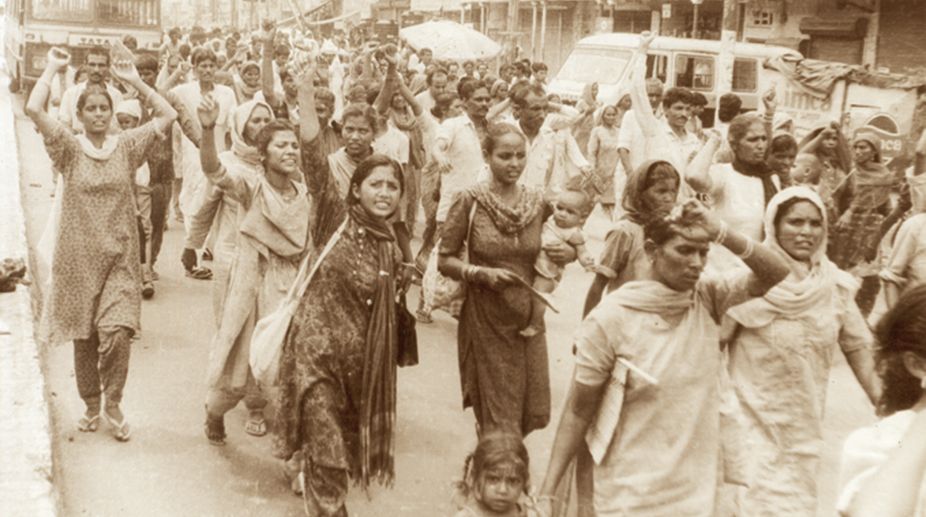Himachal minister approaches speaker invoking anti-defection law against 3 MLAs
The three MLAs' petition is pending in the high court against the Speaker for not approving their resignation from the State Legislative Assembly.

Procession of women at clock tower Saharanpur during anti liquer moovement in 1993. (File: Photograph)
Jagrat Mahila Sangathan is an important organisation of tribal women in Kishanganj tehsil of Baran district (Rajasthan). Along with another organization, Sankalp, JMS has played a key role in release and rehabilitation of bonded workers as well as asserting rights of Sahariya and other tribals of this region. Alongside the wider struggle of the community against exploitation, members of the organization felt strongly that they also needed efforts at the social level which had a special relevance for them.
As 52-year-old Kalibai, an active member of JMS from Geekcha village explained, “Even as we were winning some of our rights, our problems were increasing at another level. With the increase in liquor sale points, liquor consumption by men was increasing rapidly. On the one hand the meager income of the family was being spent on liquor, while on the other more work burden was imposed on women. Above all there was an increase in violence against women. So, some of us decided that the time had come for some real action on this front as well.”
The women knew that liquor contractors are very powerful people with political connections. Despite this they decided to act against the proliferation of sale-points and smashed up some. This galvanized the women of the area.
Advertisement
Much to their own surprise, nearly 1,000 women were mobilized for the anti-liquor movement. Some of the more active members spread the word in other villages so that support for the movement grew rapidly among tribal women.
Meanwhile the liquor mafia was not sitting silently. In collusion with officials, they set up the sale-points again. One official to whom the women went to complain told them that without the sale of liquor the government could not earn money for development work. When the women protested that this was destroying health and family ties, the official kept quiet.
Seeing this attitude of officials, the women decided that they had to open up another front. Using strong community ties, they prevailed upon several men to join them so that support could be obtained for setting up a system of fines against liquor consumption.
This has led to a significant decrease in liquor consumption while the funds collected from fines are being used for welfare activities. An added benefit is that several men are now contributing more to income-earning activities.
Mohini, a 42-year-old Bhil woman from Bilanmodhri village says, “The earlier anti-liquor action was initiated by Sahariya women but now looking at the benefits, Bhil and Khairwa women have also taken up this work as we believe that this movement will benefit all women.”
Similar stories of mobilisation of women against proliferation of liquor sale points even in remote places have been reported recently not just from other parts of Rajasthan but also from Uttar Pradesh, Himachal Pradesh and other states. While visiting some of these villages we realised that women are particularly disturbed by several aspects.
Firstly, the theka or the main liquor vend becomes a gathering point for goons and anti-social elements so that women and even schoolgirls start feeling more insecure. The powerful liquor contractors use their political contacts to set up additional sale-points so that liquor becomes available at more places and there is a spurt in consumption.
Secondly, there is a decrease in disposable income in the hands of women to meet basic needs. Women complain that even money for school fees of children is being spent on liquor.
Thirdly, whenever liquor consumption increases domestic violence and particularly violence against women also increases. Sexual crimes also increase. One of the most disturbing trends for women has been that even teenagers start getting addicted to liquor.
Such was the situation in Topri village of Saharanpur district of Uttar Pradesh which prompted women of this village to launch a determined anti-liquor movement. Well-connected members of a liquor mafia had turned this village into a den of illicit distillation. Some men in the village even died due to excessive consumption of liquor.
Women members of of self-help groups who had been involved in welfare activities of the village now mobilized other women and formed groups to search and seize illicit liquor from various points in the village.
They took out protest demonstrations and sent delegations to meet senior officials. This struggle continued for almost one year until the administration took effective action to shut down the illicit distillation of liquor.
Earlier the struggle against a liquor vend in Pather village of the same district had attracted attention even at the national level. The liquor contractor in this case was so powerful that the district administration sided with him even though increasing numbers of local women had sat on dharna against the liquor vend which had become a gathering point for anti-social elements.
When women organised a protest march they were beaten up brutally. This strengthened the determination of the women who cooked, ate and sang songs at the dharna site for several months overcoming barriers of caste and religion. Finally, the government had to agree to withdraw the liquor vend from the village.
However, in several other villages such struggles are proving to be an unequal battle as liquor contractors are powerful and well-connected. These struggles need wider support. In addition, a policy decision needs to be taken to ensure that where over half the residents of a village give a signed application for withdrawal of a liquor vend, it must be accepted immediately by the government.
The writers are freelance journalists who have been involved with several social movements and initiatives.
Advertisement